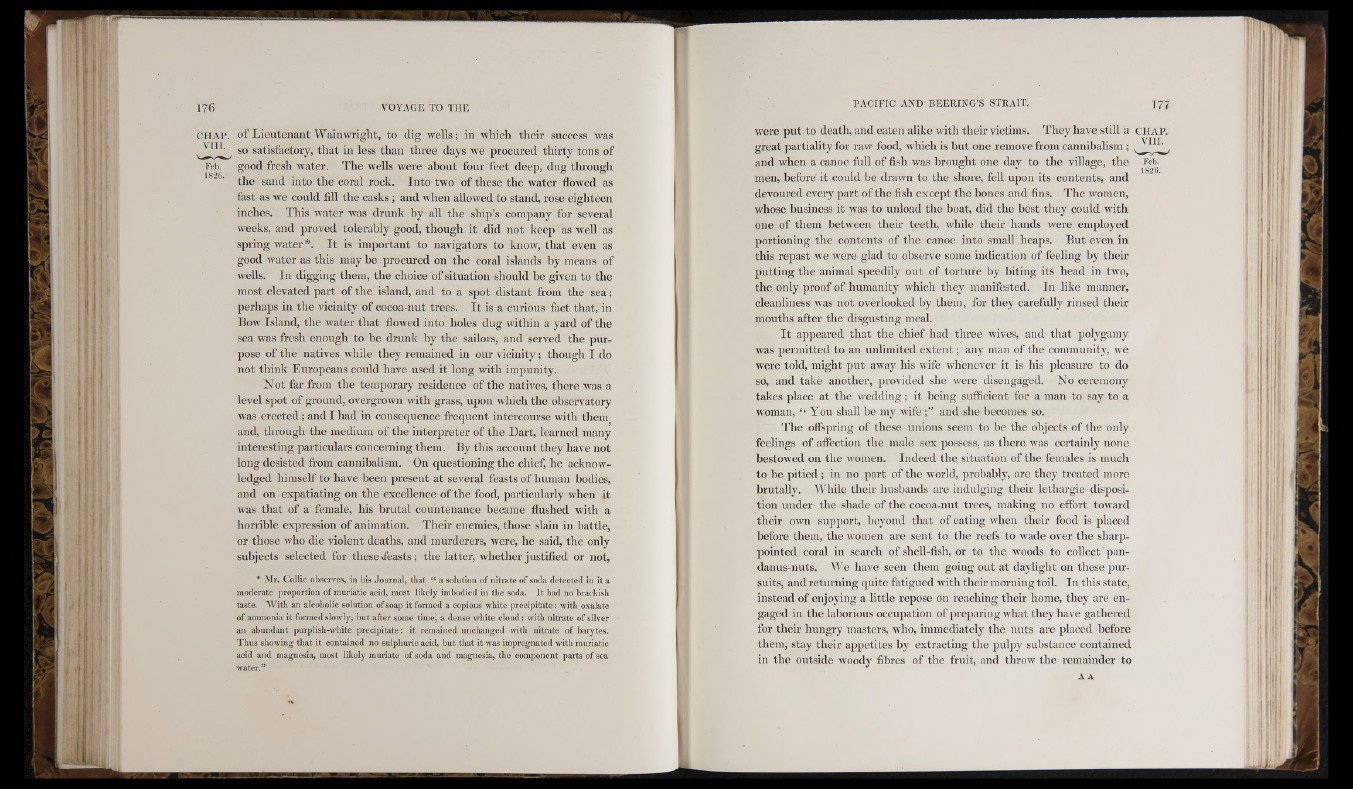
176
CH AP . of Lieutenant Wainwright, to dig wells; in w’liich their success w'as
VIII.
Feb.
1826.
so satisfactory, that in less than three days we procured thirty tons of
good fresh water. The wells -«'ere ahout four feet deep, dug through
the sand into the coral rock. Into two of these tlie water fiow'ed as
fast as we could fill the casks; and when allowed to stand, rose eighteen
inches. This water was drunk by all the sliip’s company for several
weeks, and proved tolerably good, though it did not keep as w'ell as
spring water*. It is important to navigators to know, that even as
good water as this may be procured on the coral islands by means of
wells. In digging them, the choice of situation should be given to the
most elevated part of the island, and to a spot distant from the sea;
perliaps in the vicinity of cocoa-nut trees. It is a curious fact that, in
Bow Island, the water that flowed into holes dug within a yard of the
sea was fresh enough to be drunk by the sailors, and served the purpose
of the natives while they remained in our vicinity; though I do
not think Europeans could have used it long with impunity.
No t far from the temporary residence of the natives, there was a
level spot of ground, overgrown with grass, upon which the observatory
was erected ; and I had in consequence frequent intercourse with them
and, through the medium of the interpreter of the Dart, learned many
interesting particulars concerning them. By this account they have not
long desisted from cannibalism. On questioning the chief, he acknowledged
himself to have been present at several feasts of human bodies,
and on expatiating on the excellence of the food, particularly when it
was that of a female, his brutal countenance became flushed with a
horrible expression of animation. Their enemies, those slain in battle,
or those who die violent deaths, and murderers, were, he said, the only
subjects selected for these Teasts; the latter, whether justified or not,
* Mr. Collie observes, in his Journal, that “ a solution of nitrate of soda detected in it a
moderate proportion of muriatic acid, most likely imbodied in the soda. I t had no brackish
ta-ste. With an alcoholic solution of soap it formed a copious white precipitate : with oxalate
of ammonia it formed slowly, but after some time, a dense white cloud; with nitrate of silver
an abundant purplish-white precipitate: it remained unchanged with nitrate of barytes.
Thus showing that it contained no sulphuric acid, but that it was impregnated with muriatic
acid and magnesia, most likely muriate of soda and magnesia, the component parts of sea
water.”
were put to death, and eaten alike with their victims. They have still a CHAP.
great partiality for raw food, wliich is but one remove from cannibalism ;
and when a canoe full of fish was brought one day to the village, the
Feb.
1826.
men, before it could be drawn to the shore, fell upon its contents, and
devoured every part of the fish except the bones and fins. The women,
whose business it was to unload the boat, did the best they could with
one of them between their teeth, while their hands w'ere employed
portioning the contents of tiie canoe into small heaps. But even in
this repast we were glad to observe some indication of feeling by their
putting the animal speedily out of torture by biting its head in two,
the only proof of humanity winch they manifested. In like manner,
cleanliness was not overlooked by them, for they carefully rinsed their
mouths after the disgusting meal.
It appeared that the chief had three wives, and that polygamy
was permitted to an unlimited extent; any man of the community, we
were told, might put aivay his wife whenever it is liis pleasure to do
so, and take another, provided she were disengaged. No ceremony
takes place at the wedding ; it being sufficient for a man to say to a
woman, “ You shall be my wife and she becomes so.
The offspring of these unions seem to be the objects of the only
feelings of affection tlie male sex possess, as there was certainly none
bestowed on the women. Indeed the situation of tlie females is much
to be pitied ; in no part of the world, probably, are they treated more
brutally. YY’hile tlieir liusbands are indulging their lethargic disposition
under the shade of the cocoa-nut trees, making no effort toward
their owm support, beyond that of eating wlieii their food is placed
before tliein, the women are sent to the reefs to wade over tlie sliarp-
pointed coral in search of shell-fish, or to the woods to collect pan-
daiius-iiuts. YVe liave seen them going out at daylight on these pursuits,
and returning quite fatigued with their morning toil. In this state,
instead of enjoying a little repose on reaching their home, tliey are engaged
in the laborious occupation of preparing what they have gathered
for their iunigry masters, wlio, immediately the nuts are placed before
them, stay tlieir appetites by extracting the pulpy substance contained
in tlie outside woody fibres of the fruit, and throw' the remainder to
A.A